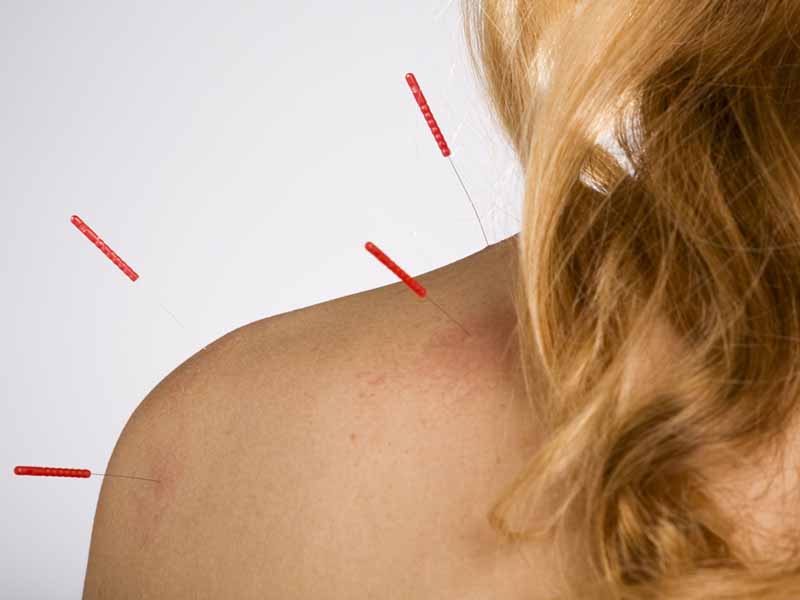Research Finds Acupuncture Effective for Chronic Pain
May 21, 2018, 09:32 am Michael Devitt – Chronic pain is a significant condition that affects millions of Americans. While family physicians play an important role for many of these patients, survey results indicate that many physicians consider the training they received in pain management inadequate, and may not feel comfortable in their ability to care for patients with chronic pain effectively.
One therapy that has received considerable attention for the treatment of chronic pain is acupuncture. In an update of patient data meta-analysis published in the May edition of the Journal of Pain, researchers with the Acupuncture Trialists' Collaboration concluded that acupuncture is effective for the treatment of chronic pain, that the effects of acupuncture persist over time, and that the benefits of acupuncture cannot be explained away solely by the placebo effect.
Study Details
The Journal of Pain research updated a previous meta-analysis published by the same group of authors in 2012. In the 2012 meta-analysis, the researchers included patient data from randomized controlled trials (RCTs) published through November 2008. The new meta-analysis included eligible RCTs published between December 2008 and December 2015.

Trials were considered eligible for inclusion if they met the following criteria:
- patients experienced one of four chronic pain conditions (nonspecific back or neck pain, shoulder pain, chronic headache or osteoarthritis);
- duration of pain lasted at least four weeks for musculoskeletal disorders;
- at least one patient group in each trial received acupuncture and one group received no acupuncture or sham acupuncture;
- the primary endpoint was measured at least four weeks after the initial acupuncture treatment session; and
- patient allocation concealment was determined unambiguously to be adequate.
Thirteen RCTs met eligibility criteria. Individual patient data was received from 10 RCTs, representing 2,905 patients. When combined with the 2012 research, the new meta-analysis incorporated data from 20,827 patients over 39 trials.
Story Highlights
More than half of the RCTs (23) used acupuncture based on traditional Chinese techniques; the rest used Western techniques or a combination of the two. In nine RCTs, acupuncture points were selected according to a fixed needle formula (i.e., the same points were used on all study participants); the remaining trials selected points according to a flexible formula (in which a fixed formula is used on all participants, and additional points are chosen for each participant based on individual diagnosis or symptoms) or an individualized formula (in which the practitioner is free to choose the points to be stimulated).
In 80 percent of the RCTs, patients underwent between six and 15 acupuncture sessions. Most patients received acupuncture one to two times per week. In slightly more than half of the RCTs, the typical acupuncture session lasted less than 30 minutes.
Results
"The results confirm and strengthen previous key findings that acupuncture has a clinically relevant effect compared with no acupuncture control," the authors wrote. These effects appeared to persist for at least 12 months after receiving acupuncture. The authors added that "the effects of acupuncture are not completely explicable in terms of placebo effects," but cautioned that "factors other than the specific effects of needling at correct acupuncture point locations" contribute to the benefits derived from receiving acupuncture.
The authors addressed the issue of effect size and relevance. They argued that relevance should be determined by comparing acupuncture with no-acupuncture control because the decision physicians make to treat or refer patients "is not between acupuncture and sham but between acupuncture and no acupuncture."
They suggested that acupuncture would be "a reasonable option" to consider in patients with chronic pain, and called for additional research to determine the best way of incorporating acupuncture into the care of these patients.
Family Physician Perspective
Jennifer Frost, M.D., medical director for the AAFP's Health of the Public and Science Division, told AAFP News that nonpharmacologic treatments such as acupuncture may provide benefits to some patients. This is especially important given the effects of the ongoing opioid epidemic on pain management.
But FPs also may need more guidance about the efficacy of these treatments. "Many family physicians are open to 'alternative' therapies such as acupuncture. But without training in the benefits, harms and indications, we are not comfortable prescribing them," said Frost.
Another obstacle is payment for services. "Most insurance plans don't cover acupuncture, which significantly reduces access," she said.
Some organizations, such as the American Academy of Medical Acupuncture, offer workshops and review courses for physicians to receive training. Frost explained that her practice had an integrative medicine clinic, which allowed her to refer patients to other family physicians with more expertise in that area. Those physicians would then assess a patient's needs and determine the appropriate treatment.
Overall, however, the number of FPs trained in medical acupuncture is low. For the time being, it's likely that patients seeking acupuncture will be referred to another health care professional for care. As such, it's important that family physicians become aware of which professionals provide high-quality acupuncture in their area to ensure patients receive the best care.
"While there are family physicians who have received training in acupuncture, most would refer out for this treatment. Knowing who in the community provides quality acupuncture and what conditions they treat is necessary before referring," said Frost.
More From AAFP
American Family Physician: Complementary/Integrative Therapies That Work: A Review of the Evidence
(9/1/2016)
American Family Physician: Acupuncture for Pain
(9/1/2009)
Familydoctor.org: Chronic Pain
Additional Resources
Journal of the American Board of Family Medicine: Critical Factors to Practicing Medical Acupuncture in Family Medicine: Patient and Physician Perspectives
(March/April 2018)
Mayo Clinic Proceedings: Evidence-Based Evaluation of Complementary Health Approaches for Pain Management in the United States
(September 2016)
BMJ: Should Doctors Recommend Acupuncture for Pain?
(3/7/2018)